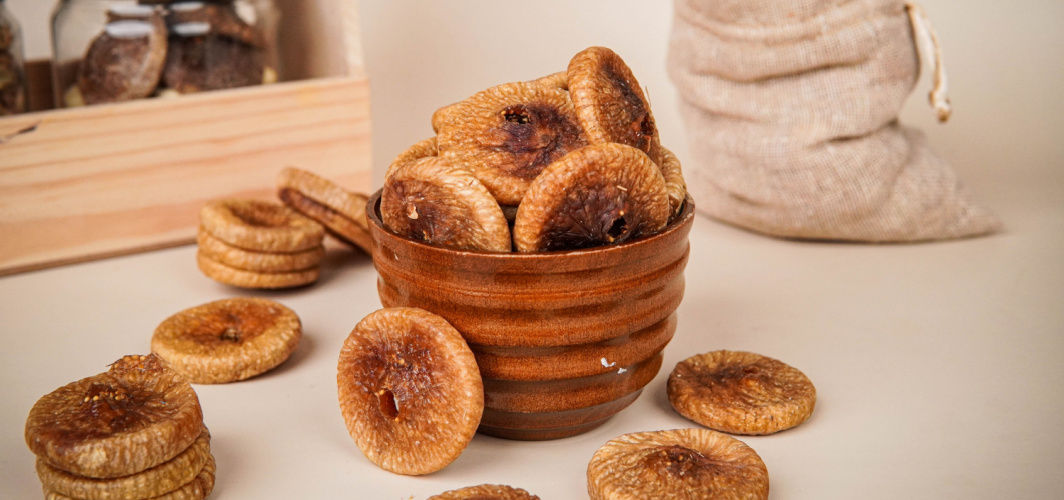General Health
6 Amazing Health Benefits Of Anjeer
6 min read
By Apollo Pharmacy, Published on - 11 September 2023
Share this article
0
0 like

Anjeer, also known as fig, is a popular fruit in Indian culture and cuisine. Native to the Middle East and Western Asia, anjeer is now widely cultivated in various regions around the world, including India. With its sweet and chewy texture, anjeer is not only delicious but also packed with various nutrients that offer several health benefits. In this article, we will provide valuable insights into this versatile fruit.
Nutritional Profile of Anjeer
Anjeer is a nutrient-dense fruit that can be beneficial for your health when consumed as part of a balanced diet. Its high nutritional content makes it a valuable addition to your daily meals or snacks.
1. Macronutrients in Anjeer
Anjeer is packed with macronutrients, and is a good source of carbohydrates, providing energy to the body.
- Figs are low in fat, making them a healthy option for weight management.
- They also contain dietary fibre, which aids in digestion and promotes satiety.
2. Micronutrients in Anjeer
In addition to macronutrients, anjeer is rich in various micronutrients that are essential for overall health and well-being.
- Figs are a good source of vitamins like vitamin A, vitamin C and several B vitamins.
- They also contain minerals such as potassium, calcium, magnesium and iron.
- These micronutrients play a crucial role in maintaining proper bodily functions, including supporting immune health, promoting bone health and aiding in red blood cell production.
Health Benefits of Anjeer
Anjeer offers numerous health benefits. Let's explore some of its amazing benefits and how it can positively impact your well-being.
1. Digestive Health
Including anjeer in your diet can contribute to improved digestive health.
- Rich in Fibre: Anjeer is an excellent source of dietary fibre, which aids in maintaining a healthy digestive system.
- Relieves Constipation: The high-fibre content in anjeer promotes regular bowel movements, relieving constipation.
- Supports Healthy Gut Flora: Anjeer contains prebiotics that nourish and support the growth of beneficial bacteria in the gut.
2. Weight Management
If you are looking to manage your weight, anjeer can be a great addition to your diet.
- Low in Calories and Fat: Anjeer is a low-calorie and low-fat fruit that can be included in a weight management plan.
- Provides Satiety: The fibre-rich nature of anjeer helps in providing a feeling of fullness, reducing the urge to overeat.
3. Heart Health
Including anjeer in your diet can help improve heart function and reduce the risk of heart disease.
- High in Potassium and Low in Sodium: The potassium in anjeer helps to counteract the effects of sodium, which is important for maintaining healthy blood pressure levels.
- Cholesterol Management: Including anjeer in your diet can also help regulate cholesterol levels, further promoting a healthy heart.
4. Blood Sugar Control
Another key benefit of anjeer is blood sugar control, thus making it an excellent snacking option for diabetics. However, one must have anjeer in moderation
- Low Glycaemic Index: Anjeer has a low glycaemic index compared to many other fruits, which means it releases sugar into the bloodstream slowly, preventing spikes in blood sugar levels.
- Blood Sugar Control: The fibre present in anjeer helps regulate insulin response and promotes better blood sugar control.
5. Bone Health
Regular consumption of anjeer helps prevent bone loss and strengthens the skeletal system.
- Healthy Bones: Anjeer is a good source of calcium and magnesium, two essential minerals necessary for maintaining strong and healthy bones. Calcium plays a crucial role in bone formation and strength, while magnesium aids in calcium absorption and prevents the breakdown of bone cells.
- Prevent Osteoporosis: Regular consumption of anjeer can help prevent conditions like osteoporosis, which is characterised by weak and brittle bones. Anjeer can also reduce the risk of fractures significantly.
6. Skin Health
Including anjeer in your diet can help improve the overall health and appearance of your skin.
- Antioxidant Properties: The antioxidant properties of anjeer can help protect your skin from damage caused by free radicals. Free radicals can accelerate ageing and contribute to the development of skin issues like wrinkles, fine lines and age spots. Anjeer can help neutralise these free radicals, thereby promoting a healthy complexion and combating signs of ageing.
- Glowing Skin: The nutrients in anjeer promote a healthy complexion by improving skin elasticity and reducing the appearance of wrinkles, leaving your skin radiant and glowing.
Potential Side Effects and Precautions
Despite having numerous health benefits, it is important to practice portion control when consuming anjeer. Some of the common side effects of anjeer include:
- While anjeer is generally safe for consumption, there are some potential side effects and precautions to be aware of. Here are a few key points to keep in mind:
- Some individuals may have an allergic reaction to anjeer and may experience itching, swelling, difficulty breathing or rash post-consumption. If you experience any of these signs after consuming anjeer, consult a doctor immediately.
- Even though anjeer has a low glycaemic index, the dried form of the fruit has higher caloric content thus making it a bad choice for diabetics. Diabetics should consume only fresh anjeer.
- Anjeer is high in fibre, which promotes healthy digestion, however, consuming too much anjeer can lead to bloating, gas or other digestive issues.
Interactions of Anjeer with Medications
Some medications may interact with the compounds present in anjeer. If you are taking any medications, especially those for diabetes, blood thinners or high blood pressure, it is important to consult with your doctor before adding anjeer to your diet. They will be able to advise you on any potential interactions or adjustments that may be necessary.
Takeaway
Incorporating anjeer into a balanced diet can be highly beneficial for overall well-being. However, it's important to consume anjeer in moderation and be aware of potential side effects. To incorporate anjeer into your diet, you can add dried or fresh anjeer to your breakfast cereal or oatmeal for a sweet and nutritious start to your day. You can include anjeer in your salads for added texture and flavour.
To reap the benefits of anjeer along with other nutritious nuts and seeds,
FAQs
Q. Is it safe to consume anjeer during pregnancy?
Anjeer is generally considered safe during pregnancy but should be consumed in moderation. It can provide essential nutrients like iron, calcium and folate required during pregnancy.
Q. Who should avoid or limit anjeer consumption?
Individuals with a history of kidney stones may need to moderate their anjeer intake, as it contains oxalates. Additionally, those with allergies to latex should exercise caution, as anjeer may trigger allergic reactions in sensitive individuals.
Q. How should anjeer be stored to maintain freshness?
Dried anjeer should be stored in an airtight container in a cool, dry place to prevent moisture absorption. Fresh anjeer should be stored in the refrigerator to maintain its freshness and prevent spoilage.
Q. Can anjeer be included in a gluten-free diet?
Yes, anjeer is naturally gluten-free, making it a suitable option for individuals following a gluten-free diet. However, always check labels when consuming processed or packaged products containing anjeer.
Q. Can anjeer be helpful for constipation in children?
Yes, anjeer's natural laxative properties and fibre content can help relieve constipation in children. However, moderation is key, as excessive consumption might lead to bloating & discomfort.
General Health
Leave Comment
Recommended for you

General Health
Can Supplements And Herbs Help Lose Belly Fat?
Discover effective natural remedies for weight reduction with supplements and herbs targeting belly fat loss. Your journey to a healthier you starts here.

General Health
Jaggery Vs Refined Sugar: Which Is The Healthier Sweetener?
This article compares jaggery and refined sugar as sweeteners, discussing their impact on health. It covers aspects such as nutrition, digestion, natural sweetness, antioxidants, immune support, respiratory health, and blood purification.

General Health
What Does A Diagnostic Ultrasound Do?
Diagnostic ultrasound or sonography, uses sound waves to create images of internal organs and tissues. It aids in diagnosing a wide range of conditions and diseases. There are many different types of diagnostic ultrasounds that can be conducted for various purposes. Read on to learn more about diagnostic ultrasound and its applications.
Subscribe
Sign up for our free Health Library Daily Newsletter
Get doctor-approved health tips, news, and more.
Visual Stories

Could There Be More to Your Snore?
Tap to continue exploring
Recommended for you

General Health
Can Supplements And Herbs Help Lose Belly Fat?
Discover effective natural remedies for weight reduction with supplements and herbs targeting belly fat loss. Your journey to a healthier you starts here.

General Health
Jaggery Vs Refined Sugar: Which Is The Healthier Sweetener?
This article compares jaggery and refined sugar as sweeteners, discussing their impact on health. It covers aspects such as nutrition, digestion, natural sweetness, antioxidants, immune support, respiratory health, and blood purification.

General Health
What Does A Diagnostic Ultrasound Do?
Diagnostic ultrasound or sonography, uses sound waves to create images of internal organs and tissues. It aids in diagnosing a wide range of conditions and diseases. There are many different types of diagnostic ultrasounds that can be conducted for various purposes. Read on to learn more about diagnostic ultrasound and its applications.